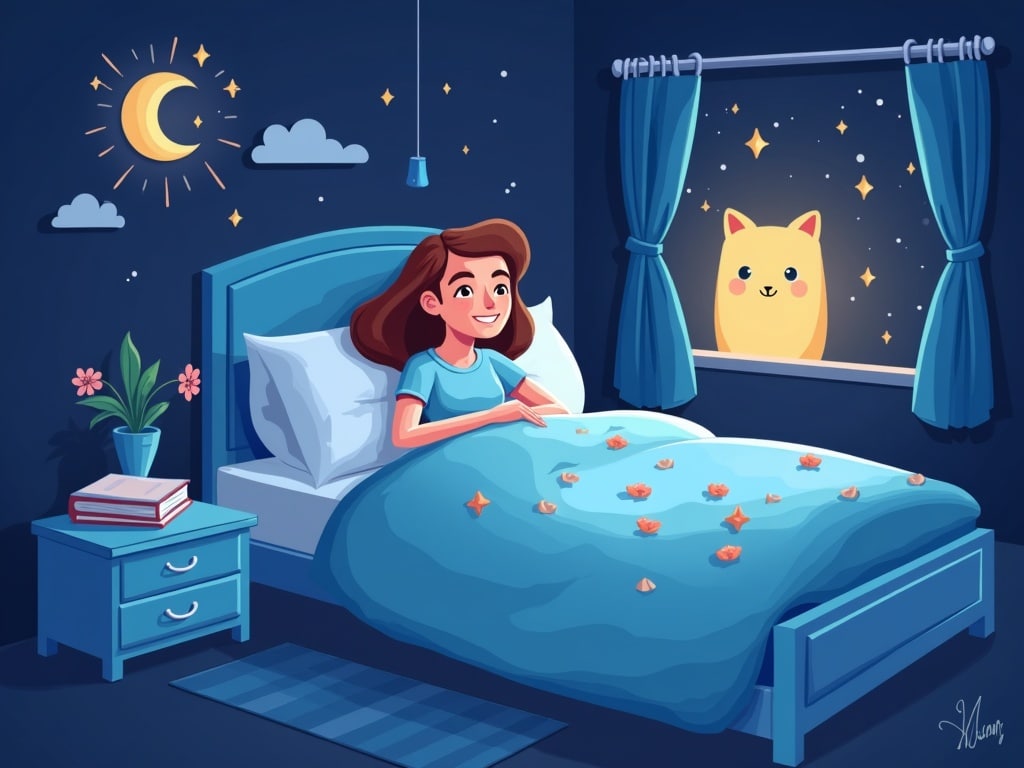How to Stop Waking Up at 3AM: A Comprehensive Guide
The clock flashes 3:00 AM. Again. You’re wide awake, mind racing, and the dread of facing the next day on insufficient sleep begins to creep in. This frustrating scenario, a nightly ritual for many, isn't just a minor inconvenience; it can significantly impact your overall well-being. But why does this happen, and more importantly, how can you stop waking up at 3 AM?
Understanding Why You're Waking Up at 3 AM
Waking up in the middle of the night, especially around 3 AM, is a common sleep disturbance. Several factors can contribute to this nocturnal interruption, and identifying the root cause is the first step toward finding a solution.
The Circadian Rhythm Connection
Your circadian rhythm, often referred to as your body's internal clock, regulates your sleep-wake cycle. It's influenced by external cues like light and darkness. Around 3 AM, your body temperature naturally dips, and the production of sleep-promoting hormones like melatonin decreases. This makes you more susceptible to waking up, especially if other factors are at play.
Stress and Anxiety
Stress and anxiety are major culprits behind sleep disturbances. When you're stressed, your body releases cortisol, a stress hormone that can interfere with sleep. Waking up in the early morning hours can be a sign that your cortisol levels are elevated, making it difficult to fall back asleep. Worries about work, relationships, finances, or health can all manifest as nighttime awakenings.
Sleep Apnea and Other Medical Conditions
Sleep apnea, a condition characterized by pauses in breathing during sleep, can frequently cause awakenings. These pauses disrupt your sleep cycle and lower blood oxygen levels, triggering a gasp for air that jolts you awake. Other medical conditions, such as restless legs syndrome (RLS), chronic pain, and frequent urination (nocturia), can also disrupt sleep and lead to 3 AM awakenings.
Dietary Factors
What you eat and drink can significantly affect your sleep. Consuming sugary foods or alcohol before bed can lead to blood sugar fluctuations that disrupt sleep. Caffeine, a stimulant, can also keep you awake, even if you consume it earlier in the day. Dehydration can cause discomfort and trigger awakenings as well.
Environmental Factors
An uncomfortable sleep environment can also contribute to nighttime awakenings. A room that's too hot, too cold, too noisy, or too bright can disrupt your sleep cycle. Poor mattress quality or uncomfortable pillows can also cause discomfort and lead to awakenings. Even exposure to blue light from electronic devices before bed can suppress melatonin production and make it harder to fall asleep and stay asleep.
Strategies to Stop Waking Up at 3 AM
Now that you have a better understanding of the potential causes of your 3 AM awakenings, let's explore practical strategies to address them.
Optimize Your Sleep Hygiene
Good sleep hygiene is the foundation for restful sleep. This involves creating a sleep-conducive environment and establishing healthy sleep habits.
- Create a Consistent Sleep Schedule: Go to bed and wake up at the same time every day, even on weekends, to regulate your circadian rhythm.
- Make Your Bedroom a Sleep Sanctuary: Ensure your bedroom is dark, quiet, and cool. Use blackout curtains, earplugs, or a white noise machine to minimize distractions.
- Invest in a Comfortable Mattress and Pillows: A supportive mattress and comfortable pillows are essential for proper spinal alignment and restful sleep.
- Limit Screen Time Before Bed: Avoid using electronic devices like smartphones, tablets, and computers for at least an hour before bed. The blue light emitted from these devices can interfere with melatonin production.
- Establish a Relaxing Bedtime Routine: Engage in calming activities before bed, such as taking a warm bath, reading a book, or listening to soothing music.
Manage Stress and Anxiety
If stress and anxiety are contributing to your nighttime awakenings, incorporate stress-reducing techniques into your daily routine.
- Practice Relaxation Techniques: Techniques like deep breathing exercises, meditation, and progressive muscle relaxation can help calm your mind and body.
- Engage in Regular Physical Activity: Exercise can help reduce stress and improve sleep quality, but avoid intense workouts close to bedtime.
- Journaling: Writing down your thoughts and feelings before bed can help you process your emotions and clear your mind.
- Seek Professional Help: If stress and anxiety are severe or persistent, consider seeking help from a therapist or counselor.

Dietary Adjustments for Better Sleep
Making changes to your diet can also improve your sleep.
- Avoid Caffeine and Alcohol Before Bed: Caffeine is a stimulant that can keep you awake, while alcohol can disrupt your sleep cycle.
- Limit Sugary Foods and Processed Carbs: These can lead to blood sugar fluctuations that disrupt sleep.
- Stay Hydrated: Dehydration can cause discomfort and trigger awakenings. Drink plenty of water throughout the day, but limit fluids before bed.
- Consider a Light Snack Before Bed: If you're hungry before bed, a light snack containing complex carbohydrates and protein, such as a handful of almonds or a small bowl of oatmeal, can help stabilize blood sugar levels and promote sleep.
Address Underlying Medical Conditions
If you suspect that an underlying medical condition is contributing to your nighttime awakenings, consult with your doctor.
- Get Screened for Sleep Apnea: If you experience symptoms such as loud snoring, pauses in breathing during sleep, or excessive daytime sleepiness, get screened for sleep apnea.
- Talk to Your Doctor About Other Medical Conditions: Discuss any other medical conditions you have with your doctor to determine if they could be affecting your sleep.
- Medication Review: Certain medications can interfere with sleep. Review your medications with your doctor to see if any adjustments are needed.
What to Do When You Wake Up at 3 AM
Despite your best efforts, you may still find yourself waking up at 3 AM occasionally. Here's what to do in those situations:
- Don't Panic: Worrying about being awake will only make it harder to fall back asleep.
- Get Out of Bed: If you've been awake for more than 20 minutes, get out of bed and do something relaxing in dim light, such as reading a book or listening to calming music.
- Avoid Looking at the Clock: Checking the time will only increase your anxiety.
- Practice Relaxation Techniques: Try deep breathing exercises or meditation to calm your mind and body.
- Return to Bed When You Feel Sleepy: Only go back to bed when you feel tired.
When to Seek Professional Help
If your 3 AM awakenings persist despite trying these strategies, it's time to seek professional help. A sleep specialist can evaluate your sleep patterns and identify any underlying sleep disorders that may be contributing to your problems. They can also recommend appropriate treatments, such as cognitive behavioral therapy for insomnia (CBT-I) or medication.
CBT-I is a type of therapy that helps you identify and change negative thoughts and behaviors that are interfering with your sleep. It's a highly effective treatment for insomnia and can help you improve your sleep quality and reduce nighttime awakenings. Medication may be an option in some cases, but it's important to discuss the potential risks and benefits with your doctor.
The Takeaway: Reclaim Your Sleep
Waking up at 3 AM doesn't have to be a nightly battle. By understanding the potential causes of your awakenings and implementing these strategies, you can reclaim your sleep and enjoy a more restful and rejuvenating night. Remember to be patient and consistent with your efforts. It may take time to find what works best for you, but with dedication and persistence, you can break the 3 AM cycle and finally get the sleep you deserve.

